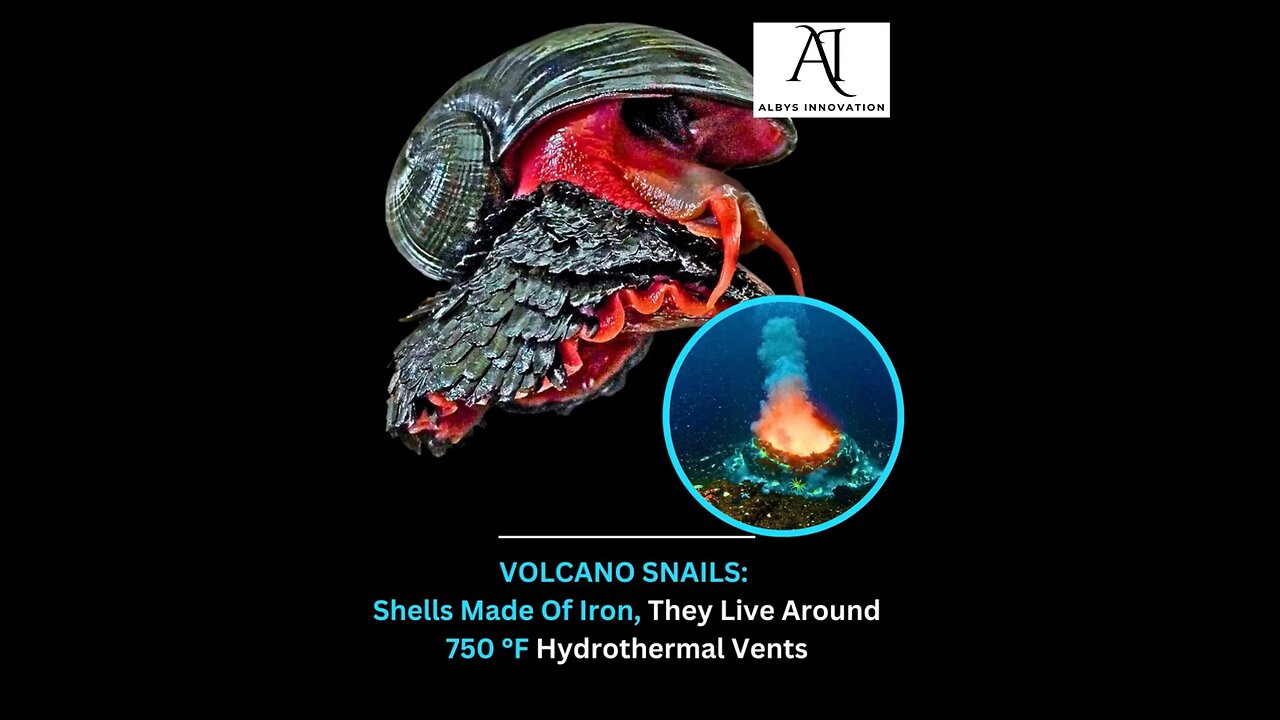Premium Only Content

Meet the Volcano Snail: Earth’s Only Iron-Clad Mollusk Thriving in Deep-Sea Infernos #snail
Deep beneath the Indian Ocean’s surface lies a creature that defies imagination—the Volcano Snail (Chrysomallon squamiferum), also known as the scaly-foot gastropod. This remarkable mollusk has evolved to survive in one of Earth’s most extreme environments: hydrothermal vents. These vents spew mineral-rich fluids at temperatures exceeding 300°C (572°F), creating a habitat that is both hostile and rich in nutrients.
Iron-Clad Armor:
What sets the volcano snail apart is its unique tri-layered shell. The outer layer is composed of iron sulfides, primarily pyrite and greigite, giving the shell a metallic sheen and magnetic properties. This iron coating provides a formidable defense against predators and the harsh conditions of its environment. Beneath this lies a middle layer of organic material, followed by an inner layer of aragonite, a form of calcium carbonate.
Extreme Habitat:
Inhabiting depths of 2,400 to 2,900 meters along the Central Indian Ridge, the volcano snail thrives near hydrothermal vents. While the vent fluids can reach staggering temperatures, the snails position themselves in areas where the water is significantly cooler, allowing them to survive in this challenging ecosystem.
Symbiotic Survival:
Lacking a traditional digestive system, the volcano snail relies on a symbiotic relationship with chemosynthetic bacteria housed in a specialized organ called the esophageal gland. These bacteria convert inorganic compounds from the vent fluids into organic nutrients, effectively feeding their host. This adaptation allows the snail to sustain itself in an environment devoid of sunlight and traditional food sources.
Conservation Concerns:
Despite its resilience, the volcano snail faces significant threats from deep-sea mining activities targeting the mineral-rich deposits around hydrothermal vents. In 2019, it became the first hydrothermal-vent species to be listed as endangered by the International Union for Conservation of Nature (IUCN). The limited distribution of this species, confined to just three known vent fields, makes it particularly vulnerable to habitat destruction.
#VolcanoSnail #DeepSeaLife #IronShell #ExtremeAdaptations #MarineBiology #HydrothermalVents #Conservation #OceanMysteries #ScalyFootGastropod
-
 1:27:34
1:27:34
TruthStream with Joe and Scott
3 days agoArchitect Richard Gage: 911 truths and more #482
5.38K3 -
 3:47:17
3:47:17
The Pascal Show
16 hours ago $1.05 earnedBREAKING! Mass Shooting At Annunciation Church In Minneapolis Multiple Shot
15.7K7 -
 LIVE
LIVE
Lofi Girl
2 years agoSynthwave Radio 🌌 - beats to chill/game to
232 watching -
 2:02:49
2:02:49
Inverted World Live
7 hours agoAnnunciation Catholic School Shooting and Spiritual Warfare w/ AK Kamara | Ep. 99
172K23 -
 10:10
10:10
Robbi On The Record
3 days agoHollywood’s Hidden Messages: Predictive Programming & What’s Next
21.6K31 -
 4:43:34
4:43:34
Drew Hernandez
12 hours agoLGBTQ TERRORIST EXECUTES CATHOLIC KIDS IN MINNEAPOLIS
16.2K18 -
 2:17:08
2:17:08
FreshandFit
8 hours ago10 Top Red Pills About American Women
51.2K18 -
 2:10:26
2:10:26
Badlands Media
13 hours agoDevolution Power Hour Ep. 384: Durham’s Blind Spots, Soros Panic, and Trump’s Economic Warfare
65.2K33 -
 3:17:28
3:17:28
TimcastIRL
7 hours agoTrans Shooter Targets Catholic Kids In Mass Shooting, Leftists Reject Prayers | Timcast IRL
228K68 -
 1:31:29
1:31:29
Brandon Gentile
1 day ago25 Year Wall Street INSIDER: $1M Bitcoin Soon Is Just The START
23.4K